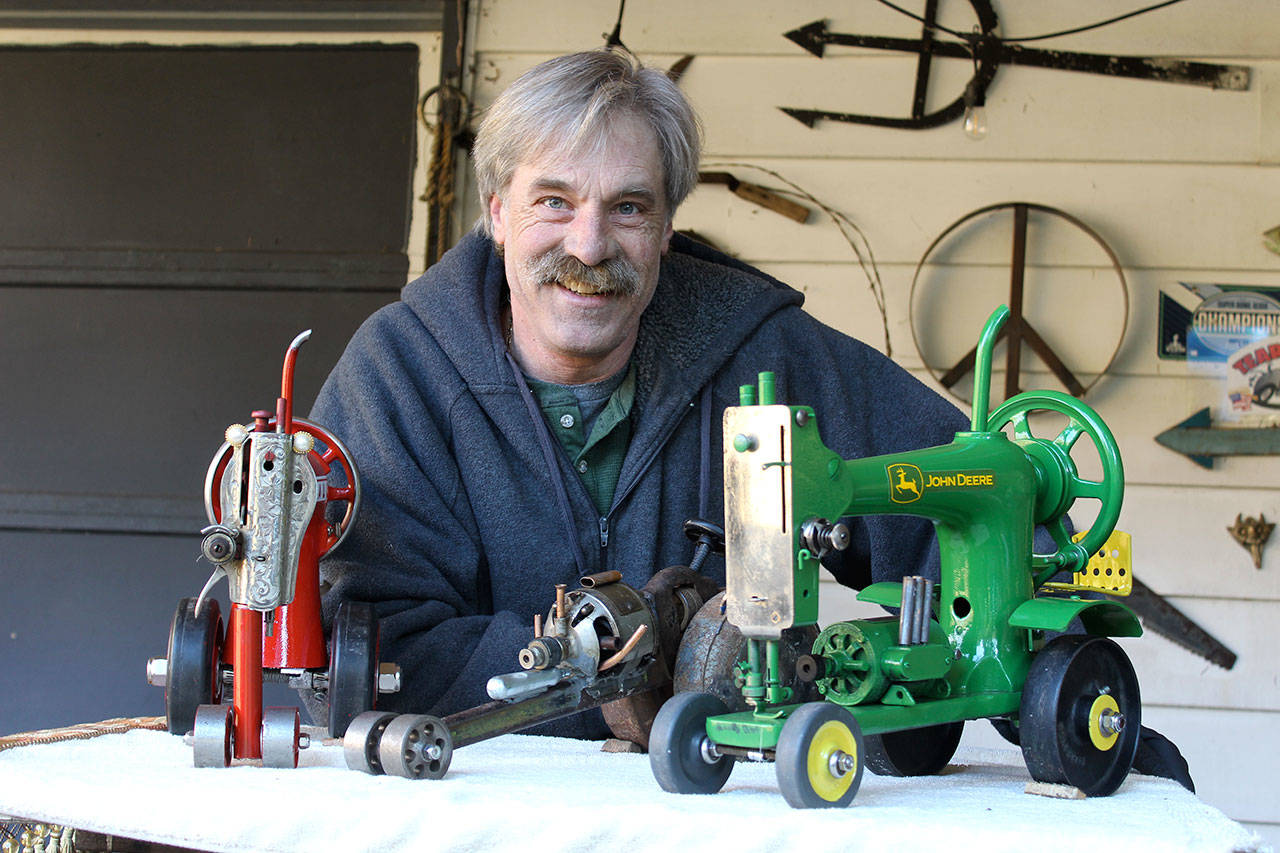Isaac Merritt Singer’s solid sturdy invention will never die.
Made of steel with a treadle pedal, signature ornate black stand and beautifully crafted wooden drawers, Singer sewing machines were made to be repaired, not replaced.
A century later, they continue to be repurposed and reborn as end tables, liquor cabinets, planters, stools, shelves, chairs, stove tops, even.
And, now, tiny tractors.
Tiny tractors that weigh a ton, that is, and are not to be toyed with.
“For a man cave, this would be the ‘fo shizzle,’” said John Norris of Clinton, as he shows off a miniature green John Deere and a red Farmall tractor he recently created.
They’re made with the main body of the sewing machine, including its spinning wheel, bobbin parts and needle plate. Norris added various items he’s collected over the years or finds at thrift shops — small wheels, spatula for a tractor seat, propane stove and conveyor belt parts.
“It’s all metal, no plastic,” he said.
Norris is one of a dozen Whidbey artists to be featured in “Rags, Rubbish, and Refuse: Artists Who Get Dirty,” an art exhibition running March 1 – April 28 at the Bayview Cash Store Hub Gallery.
The art show is part of an annual series of events planned in April during Whidbey Earth & Ocean Month that is organized by Goosefoot, a nonprofit organization.
This is the second year Goosefoot asked artists to submit art made primarily — preferably exclusively — from recycled and repurposed materials, said Marian Myszkowski, Goosefoot director of program and fund development.
Materials in the show include a car door, anchovy cans, plastic soda bottles, a tricycle, fabric, a lamp and more that will be displayed as sculpture, textiles, and one-and two-dimensional wall art.
“We are delighted with the creativity and thought that has gone into each piece,” Myszkowski said. “Whether the work is serious or whimsical, I believe each artist is making their own powerful statement by repurposing items destined for the landfill.”
Vintage Singer sewing machines in various states of undress sit on the counter top in Norris’ tinker and tool kingdom, formerly known as his garage.
“This is a 1913 machine. This one is 1903,” he said, pointing to a metal label that reveals the machine number and the year of production. “I take them completely apart. What’s amazing is all the parts still move. They still work.”
After welding or bolting pieces together, Norris, who describes himself as a “retired painter, now picker/artist,” sands, primes and paints the parts into familiar farm machinery colors. He orders company decals online.
Norris admits it’s not an original idea. Sewing machine tractors can be found for sale online and there are videos on how to make them. (Sad Singer aficionados can also be found who prefer that vintage models remain whole.)
He’s dreaming up other uses, maybe turning a miniature tractor into a lamp with a swivel arm. Maybe not.
“I just did it for fun,” Norris said. “I really didn’t make them to sell.” But he’s gotten offers anyway, and requests to make more, especially from John Deere fans. “Man, they’re really obsessed,” he commented.
Norris also didn’t make them to be functional. They may look like toy tractors to some or brightly painted miniature sewing machines ready to make miniature clothes to others.
“No, they don’t work,” Norris said, laughing. “It’s folk art.”
They also weigh a lot. He dropped one once and it dented his counter.
Norris also turned a pipe wrench into a drag car. He calls it Pipe Dreams.
“Winter,” Norris said, explaining his motivation. “I was bored.”
— “Rags, Rubbish, and Refuse: Artists Who Get Dirty,” an art exhibit sponsored by Goosefoot, will be on view March 1 – April 28 at the Bayview Cash Store Hub Gallery, 5603 Bayview Road, Langley. Open daily 10 a.m. – 6 p.m.


